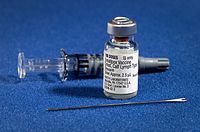
Photo from wikipedia
In this study, a double antibody sandwich enzyme-linked immunosorbent assay (DAS-ELISA) method was established to detect the antigenic changes of thermally processed products containing glycinin. The proposed DAS-ELISA method used… Click to show full abstract
In this study, a double antibody sandwich enzyme-linked immunosorbent assay (DAS-ELISA) method was established to detect the antigenic changes of thermally processed products containing glycinin. The proposed DAS-ELISA method used heat-treated antigen-absorbing antiserum as the coating antibody, and horseradish peroxidase (HRP)-labeled rabbit anti-glycinin polyclonal antibody as the detection antibody. The specificity test results which were obtained using the proposed method indicated that good specificity had been achieved. The cut-off value was 0.388, and the LOD was determined to be 19.53 ng/mL. The coefficient of variation was less than 5.25% (intra-day) and 9.50% (inter-day). In this study's milk powder addition test, the recovery rate of the glycinin ranged between 83.65% and 90.13%. The established DAS-ELISA method was also used to detect soybean thermal processing products, such as soy sauce, steamed fish and soy sauce, soybean paste, beef sauce, soy milk powder, and tofu. The results showed that the OD450 values of the aforementioned products were lower than the OD450 values of the glycinin in defatted soybean flour. Therefore, it was indicated that the above products has undergone different degrees of thermal processing. In other words, the majority of the epitopes of glycinin in the products had been destroyed by the thermal processing and could not be combined with heat-treated antigen-absorbing antiserum.
Journal Title: International journal of biological macromolecules
Year Published: 2022
Link to full text (if available)
Share on Social Media: Sign Up to like & get
recommendations!